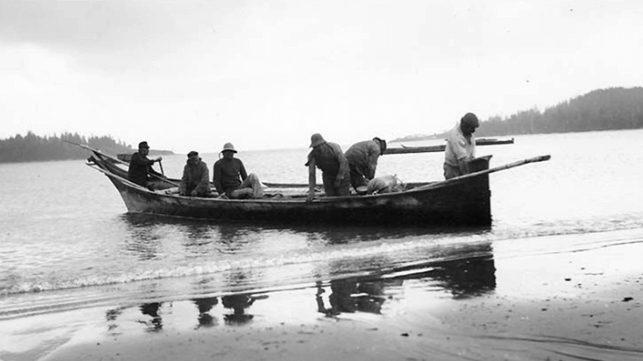NOAA Grants Makah Tribe Permission to Resume Subsistence Whaling

The National Oceanic and Atmospheric Administration has authorized the Makah Tribe to resume whale hunting after a 25-year hiatus. The decision allows the tribe to carry out limited ceremonial and subsistence hunting, in accordance with its treaty rights and international quotas.
In an announcement Thursday, NOAA Fisheries said that it has granted the Makah Tribe a waiver from the Marine Mammal Protection Act to hunt Eastern North Pacific gray whales. While the decision is controversial, the tribe retains a specific treaty right for this practice under the Treaty of Neah Bay of 1855.
In that year, the tribe transferred roughly 100,000 acres of its historical territory to the federal government, retaining the northwest corner around Cape Flattery as a reservation. In return, the tribe received federally-administered benefits valued at $33,000 (about $1 million today), plus medical care, basic education, and rights for "taking fish and of whaling or sealing at usual and accustomed grounds." The tribe has been asking NOAA to follow the treaty since 2005, and the petition has been working its way through the administrative process since.
NOAA's decision imposes additional rules on how the tribe may exercise these rights. The tribe must now apply for a hunt permit, enter into an agreement with the federal government, and abide by limits on time, area, harvest quantity, whale end uses, and monitoring requirements. The rule also limits the tribe to 25 whales per decade, in alignment with a quota set by the International Whaling Commission. NOAA estimates the size of the current gray whale population at about 17,000-21,000 individuals, and it has been off the endangered-species list for 30 years.
“This final rule represents a major milestone in the process to return ceremonial and subsistence hunting of Eastern North Pacific gray whales to the Makah Tribe,” said Janet Coit, assistant administrator for NOAA Fisheries. “The measures adopted today honor the Makah Tribe's treaty rights and their cultural whaling tradition that dates back well over 1,000 years, and is fundamental to their identity and heritage.”

that matters most
Get the latest maritime news delivered to your inbox daily.
The last time the tribe hunted a whale was in 1999, and it was highly controversial among conservationists and environmentalists. This time, the Makah have the support of Washington State's political leaders.
"Tribal treaties and the provisions in them represent a commitment - an obligation - from the United States government to tribes. That includes the 1855 Treaty of Neah Bay," said Rep. Derek Kilmer (D-WA), who represents the Olympic Peninsula. "Upholding treaty rights means respecting decisions - even when they may be seen as controversial - and it means living up to commitments made."
